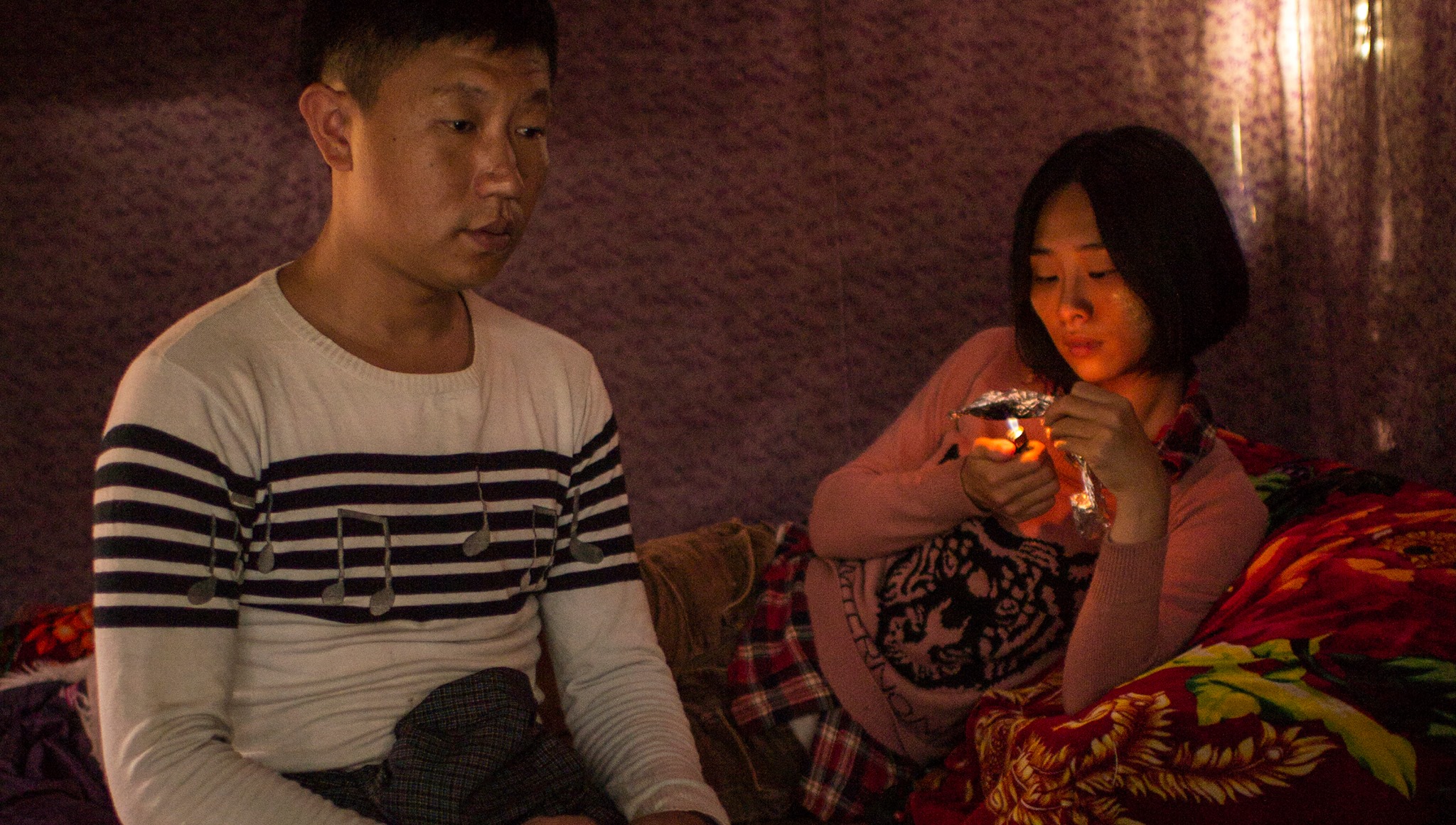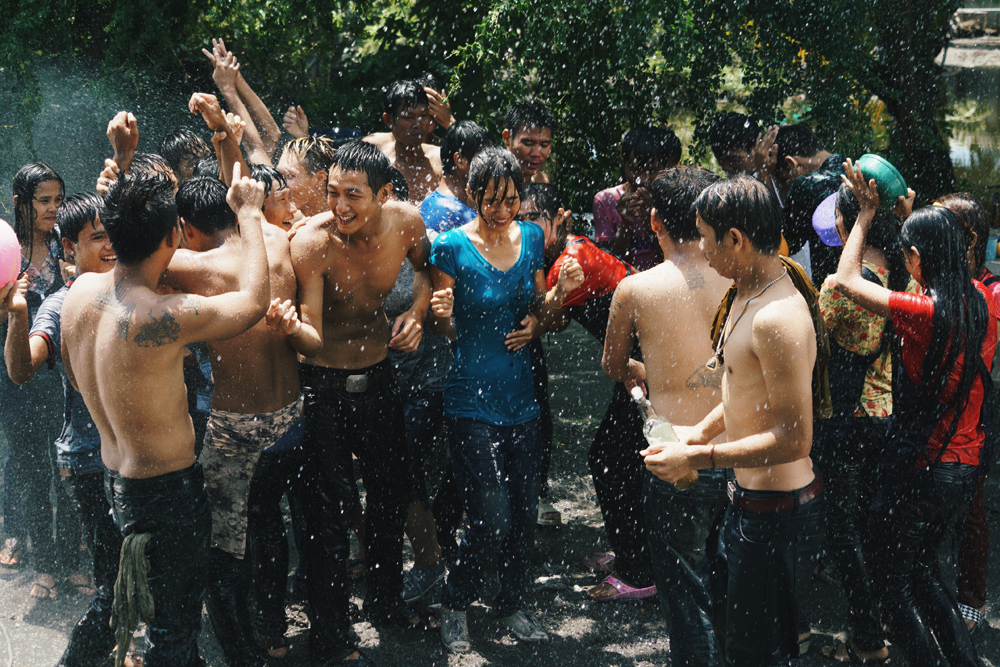Burmese-born Taiwanese filmmaker Midi Z, who hails from northern Shan State’s Lashio Township, left Burma for Taiwan in 1998, when he was a 16-year-old student going by the name of Thain Kha Min Lwin.
Today, the 34-year-old filmmaker tries to pull into focus the meaning of “home” by revisiting childhood memories in his films that zoom in on the experiences of his family and friends. His characters, in particular, were inspired by the stories of his siblings, who either worked as jade miners in Hpakant or were illegal migrant workers in Thailand.
Of the four feature-length films and two documentaries to his name, Ice Poison (2014) and The Road to Mandalay (2016) are his two most celebrated. The former draws an intimate portrait of two young people in Lashio who try to escape their harsh lives by selling—and even using—drugs, while the latter is more of a love story and tells the tale of two young illegal migrants in Thailand. Both films won several awards at local (Taiwan) and international film festivals. The Road To Mandalay was screened at the historic Waziya Cinema on Monday by Rangoon’s Memory! International Film Heritage Festival.
Knowing that his Burmese audience was not familiar with his way of filmmaking—which incorporates a more realistic and subjective approach to storytelling—the director said he was both excited and nervous to screen the film in his home country, his worry being that the audience would not understand his interpretation of Burmese memories. The Irrawaddy sat down with Midi Z on Tuesday to talk about filmmaking and what inspires it.
When and how did you realize you wanted to be a filmmaker?
I think it all started with Ice Poison. I made two feature films before Ice Poison; Return to Burma and Poor Folk, as well as many other short films. But I did not have the confidence to be a filmmaker before Ice Poison, because I thought I couldn’t make ends meet solely through being a filmmaker. But Ice Poison was very successful. It was a Taiwanese entry for the Oscars ceremony. Since then, I’ve aimed at becoming a filmmaker.
But was there a starting point, though?
It was actually quite by coincidence. One of my friends in Lashio asked me to buy him a camera when I was 19, at my senior high school in Taiwan. It was to film [record] a wedding party in Lashio. I bought it, but I couldn’t send it back. I used it to earn money by filming wedding parties in Taiwan. And then gradually… I became interested in films. In Taiwan, there are a lot of resources in libraries and schools. I was really hungry to learn things. I watched 1,000 films within three years. I read a lot of books about films. That’s how I learned more about filmmaking.

What does filmmaking mean to you?
Filmmaking, for me, is living a life. It’s combined with my life. Every day, my job is connected to filmmaking. Not just at the time of shooting films. The meaning of filmmaking, for me, is like writing diaries. It’s like expressing my life. Without filmmaking, I couldn’t help my living soul be easy or stable. Sometimes, you have a lot of stories in your country or your family that you couldn’t tell or express. So I use filmmaking to express my feelings, about my family, relatives, and friends.
Given that you experienced the cultures of two different countries, how did these cultural differences affect you and your way of filmmaking?
There are two points. If I didn’t have any Burmese background, I wouldn’t be able to make films like this. In Taiwan, they recognize me as a Burmese director. In Burma, I don’t know if anyone would recognize me as Taiwanese or a foreigner. But for myself, I am mixed with two diverse cultures. They can’t be separated. Burma…it raised and made me strong enough to make films. In Taiwan, no one tells me to make films by a very small camera with three crew-members.
I came from Burma and I only made stories of my hometown because I feel a lot about it. That’s quite simple. Not like … “I want to make things for my country. I want to tell stories about my society.” Not like that. My films are very personal.
Of all your films—shorts, documentaries, and features—which one is closest to your heart? And why?
Maybe Return to Burma—my very first feature film. That film is about a Burmese construction worker in Taiwan who returns to Burma with the hope of change in his home country after it held its first presidential election in decades. But he’s later disappointed to see not much has changed. His siblings want to leave Burma for Malaysia or Thailand while he wants to stay in the country. It’s about his personal conflict with himself and his siblings.
That story is the closest one to me because, in 2008, I was actually planning to go back to Burma to run a wedding photo studio. But that plan failed.

There are always two main themes in your films: “Burma” and “home.” What do these two words mean to you?
I don’t know. That’s what I’m searching for in filmmaking.
When I was in Taiwan, I missed home every day. I wanted to go back to Lashio to live with my mother, with my family. But when I went back to Burma, I started thinking about how I could do [more] things if I was in Taiwan. It’s a conflict. For me, when someone leaves his home for a long time, he can never go back. You are affected by other cultures. You can go back physically, very easily. But emotionally, you could never go back to your original land. That’s why homesickness [lasts] forever.
People identify you as a Burmese-born Taiwanese filmmaker. How would you identify yourself, though?
I am mixed. I am combined with two identities in an emotional way. It’s very complicated. Burma, it didn’t train me as a filmmaker. Taiwan gave me an education, resources, even investment for my films. But without Burma, I couldn’t be a filmmaker. Without Burma, I wouldn’t be able to do a lot of stories like this. If I have to identify myself, I would say I belong to two countries. Without one of them, I couldn’t be here as I am now.
How have your films changed and affected you personally?
A lot. Of course they’ve made me rich. That’s true! Art is important. Firstly, you can use art to express the emotions you really care about. Whether you are rich or poor, you make art for your life. Secondly, you have to find way to survive by making films. That’s important. You need to connect your way of surviving with what you love. That’s important in our industry.
Personally, I was very strong at the beginning and thought humans can change things by themselves, by their energy or ambition or desire. When I went to the jade city of Hpakant, I met many other Burmese people and I felt very weak. But now I am balanced and understand that sometimes, you can’t change things.

After the screening of your film The Road to Mandalay yesterday, a lot of local Burmese filmmakers had mixed feelings. They appreciated your filmmaking, but they thought the film barely had “Burmese” things. What would you say to them?
Of course film is very subjective. If someone thinks that a film about Shwedagon Pagoda should be speaking Burmese language and featuring people who wear longyi, I would say it’s not the Myanmar that I see. It’s not really Myanmar. Identity is not only the language or the appearance, but it’s what’s inside. I agree that maybe 50 percent of the film doesn’t make them feel connected to Myanmar. But at least 30 percent should.
What do you think of the Burmese film industry?
There are many stories to be told. If an artist really cares about his hometown, he or she would see stories everywhere. I don’t think the weakness of the Burmese film industry is about technological things. I noticed that many filmmakers here don’t have a chance and the opportunity to watch good films. The weakness is about a lack of information and resources. There are no libraries for videos or the arts. It doesn’t mean we don’t have culture. We have art. We have culture and history, but no resources for filmmakers.
A film is not just a film or cinema. It can be political, economic, cultural, ethnic, or everything. We shouldn’t discuss films just inside the film industry. That’s a weak point. There are associations like the MMPO [Myanmar Motion Picture Organization] and independent filmmakers networks. They should do something to provide information and lectures about films for filmmaking students.
The most important element in a film is how the director sees things and how he expresses it. But the way that he expresses his feelings should communicate with or engage the audience. This is cinema. Cinema is not only about equipment.

















